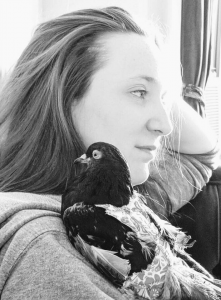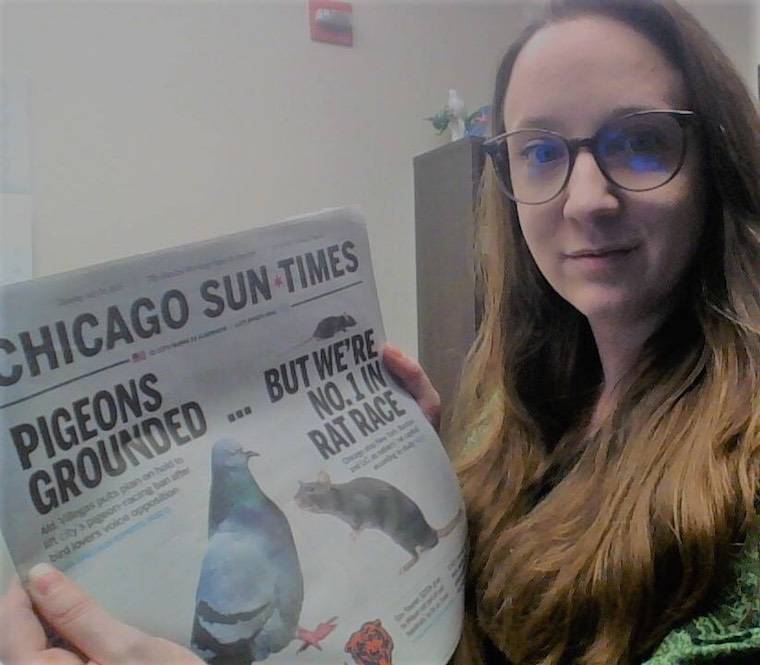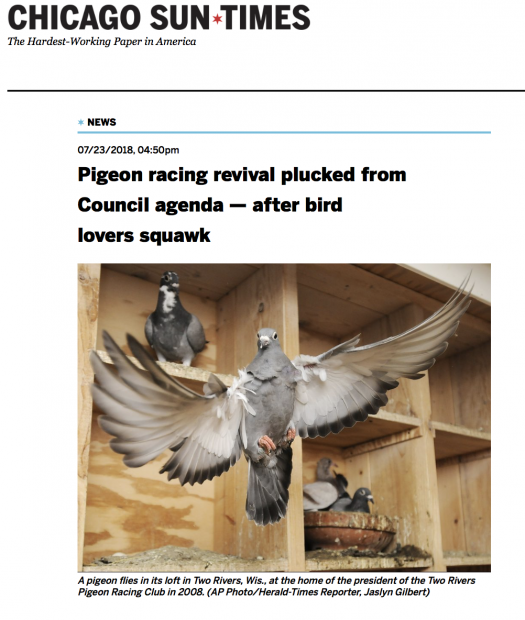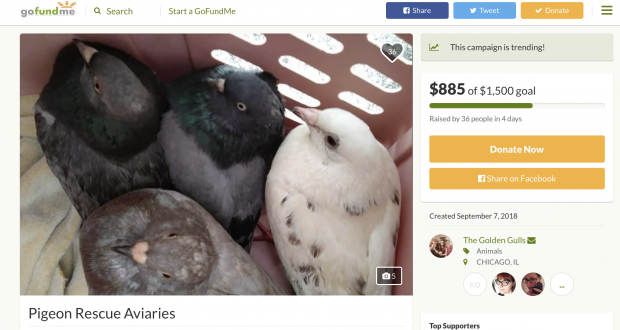Pigeon racing has a cruel, ugly side. Don’t allow it in Chicago

About 100 pigeons were abandoned in a parking lot at the corner of Wilson and Ravenswood in November. | Photo courtesy of Katie-Anne O’Neil
“Pigeon racing” may conjure images of robust, healthy birds zipping across finish lines in quick succession. But what it really means is releasing strategically bred pigeons far, sometimes hundreds of miles from their homes, to see which one makes it back the fastest.
Many of them don’t make it back at all.
The news that three Northwest Side aldermen are trying to legalize pigeon racing as a sport is alarming to the bird enthusiast community and should be to the entire city.
Here’s what those aldermen may not know: Racing pigeons are domestically raised birds that don’t have the survival skills to make it in the wild. The pigeons we see on the street were raised by their parents to survive in an urban setting. But when humans selectively breed birds and feed them from hatching, they don’t develop the scrappy resourcefulness that wild pigeons have.
They don’t know how to find food or avoid predators, and they haven’t been produced by natural selection, but rather by selection by humans for certain qualities.
An investigation by PETA released in 2012 found that more than 60 percent of racing pigeons don’t make it back to their home lofts.
And the birds that don’t perform to the standard of their pigeon-racing owners are subject to abandonment and culling, the killing of weak or undesirable specimens in a group of animals.
The aldermen stipulate that standards will be enforced regarding the conditions in which the racing birds are kept, the containers that feed will be stored in and the registration of individual birds. But none of this regulation will protect the birds, at all, once the race begins. PETA lists common methods of culling as suffocation, drowning, decapitation, neck-breaking, and gassing. If pigeon racing is legalized in Chicago, will there be regulations in place for which manners of culling birds are considered humane?
And while the aldermen say that the ban will only be lifted for members of pigeon racing organizations in good standing, how beneficial is it to be in good standing with an organization wherein culling and abandonment are commonplace?
When I gave word to Annette Prince, the director of the bird rescue organization Chicago Bird Collision Monitors about the potential legalization, she said the organization responds to hundreds of calls every year for banded pigeons and doves that have been attacked by predators, injured, abandoned and starved.
Those birds need rescue and care. Homes and medical treatment need to be provided for endless numbers of rescued racing pigeons because, in most cases, owners do not want the lost birds back.
Pigeon racing, legal in many U.S. cities, is already affecting local bird rescue organizations even before the city considers legalizing it.
In November of 2017, as previously reported by the Sun-Times, Chicago Bird Collision Monitors rescued about 75 of more than 100 banded pigeons dumped in a parking lot in Ravenswood. The rest succumbed to predator attacks or were found frozen to death. Those that lived had to be treated for avian pox, likely a result of having been kept in poor conditions before they were dumped. It was a rescue effort that spanned more than a week and involved multiple wildlife rescue agencies and many volunteers who came out in the cold to catch the birds with boxes, with nets, and with our hands.
If the city legalizes pigeon racing, it will be this organization and other bird advocacy groups that will be called upon to capture, treat and place the birds after they’re found emaciated and bleeding — at the expense of the organizations. Their resources are already stretched thin. And the birds that are rescued will be the lucky ones — many more won’t have a chance.
Birds have an internal navigation system that’s still largely a mystery to us. Pigeons are intelligent birds that can recognize individual human faces. Domestically raised pigeons are affectionate companion animals and rewarding pets, not objects to be used for sport and then dumped like garbage.
 Katie-Anne O’Neil, shown here with pigeon friend Jonah, is a bird rescue volunteer for Chicago Bird Collision Monitors. She lives in Chicago with her strictly-indoor kitties and some button quail. Everything she does for pigeons, she does for her beloved late ringneck dove, Ed the Bird.
Katie-Anne O’Neil, shown here with pigeon friend Jonah, is a bird rescue volunteer for Chicago Bird Collision Monitors. She lives in Chicago with her strictly-indoor kitties and some button quail. Everything she does for pigeons, she does for her beloved late ringneck dove, Ed the Bird.
VICTORY UPDATE:
From the Chicago Sun-Times, July 25

VICTORY UPDATE:
From the Chicago Sun-Times, July 25
Pigeon racing revival plucked from Council agenda — after bird lovers squawk…
A controversial plan to sanction the sport of pigeon racing in Chicago may be grounded before it’s even cleared for take-off.
Ald. Gilbert Villegas (36th) said Monday he asked the City Council’s Finance Committee not to vote on the ordinance he introduced last month after he was bombarded with emails and Facebook messages by bird lovers.




